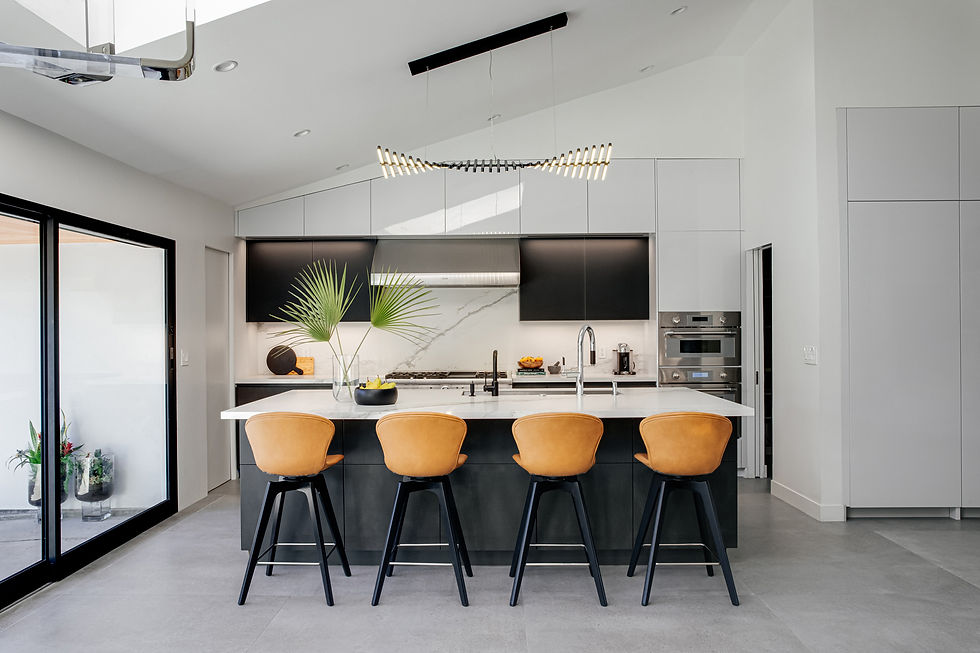What Makes a House Modern? A Design Guide for the Contemporary Homeowner
- Leicht

- May 20
- 3 min read
Modern home design is more than a trend—it's a reflection of lifestyle, values, and innovation. For homeowners in Los Angeles and beyond, understanding the principles of modern architecture can transform living spaces into functional, sustainable, and aesthetically pleasing environments. This guide explores the key elements that define modern homes, offering insights for those looking to build or renovate with a contemporary touch.

1. Embracing Open and Functional Spaces
Modern homes prioritize open floor plans that foster connectivity and flexibility. By minimizing walls and barriers, these layouts encourage interaction and allow natural light to permeate throughout the space. This design approach not only enhances the sense of spaciousness but also aligns with the contemporary lifestyle that values communal living and adaptability.
2. Utilizing Natural and Sustainable Materials
The use of materials such as wood, glass, and steel is central to modern design. These elements are often left exposed to showcase their natural beauty and structural integrity, adhering to the principle of "truth to materials." Incorporating sustainable and eco-friendly materials reflects a commitment to environmental responsibility and long-term durability.

3. Integrating Smart Technology
Modern homes seamlessly incorporate technology to enhance comfort and efficiency. From smart lighting systems to automated climate control, these features are designed to be intuitive and unobtrusive, complementing the minimalist aesthetic while providing practical benefits.
4. Blurring Indoor and Outdoor Boundaries
A hallmark of modern design is the seamless transition between indoor and outdoor spaces. Large windows, sliding glass doors, and open patios create a harmonious connection with nature, extending the living area and promoting a sense of openness. This integration is particularly beneficial in regions like Southern California, where the climate supports year-round outdoor living.

5. Prioritizing Minimalism and Clean Lines
Modern architecture is characterized by simplicity and clarity of form. Clean lines, uncluttered spaces, and a restrained color palette contribute to a serene and orderly environment. This minimalist approach emphasizes functionality and allows the architectural elements to take center stage.
6. Incorporating Energy Efficiency
Energy efficiency is a key consideration in modern home design. Features such as high-performance insulation, energy-efficient windows, and renewable energy sources like solar panels reduce environmental impact and lower utility costs. These sustainable practices are integral to the modern ethos of responsible living.

7. Focusing on Functionality and Flexibility
Modern luxury kitchens in Modern homes are designed with adaptability in mind. Flexible spaces that can serve multiple purposes—such as home offices, guest rooms, or recreational areas—reflect the dynamic needs of contemporary life. Built-in storage solutions and modular furniture further enhance the functionality of these spaces.
8. Emphasizing Natural Light
Maximizing natural light is a fundamental aspect of modern design. Strategically placed windows, skylights, and open layouts allow sunlight to illuminate the interior, creating a warm and inviting atmosphere. This not only enhances the aesthetic appeal but also contributes to energy efficiency by reducing the need for artificial lighting.

9. Showcasing Architectural Innovation
Modern homes often feature innovative architectural elements that challenge traditional design norms. Cantilevered structures, unconventional shapes, and creative use of materials demonstrate a willingness to explore new ideas and push boundaries. These bold design choices result in unique and visually striking residences.
10. Creating a Personalized Living Experience
Ultimately, modern home design is about creating spaces that reflect individual preferences and lifestyles. By combining functionality, sustainability, and aesthetic appeal, modern homes offer a personalized living experience that caters to the needs and desires of contemporary homeowners.
Conclusion
Modern home design is a dynamic and multifaceted approach that prioritizes simplicity, functionality, and harmony with the environment. By embracing these principles, homeowners can create spaces that are not only visually appealing but also conducive to a modern way of life. Whether building anew or renovating, incorporating modern design elements can result in a home that is both timeless and tailored to contemporary living.
Ready to experience modern design firsthand? At Leicht Costa Mesa, our kitchen showroom in Orange County brings these principles to life through functional layouts, integrated lighting, sustainable materials, and German Kitchens. Whether you're seeking inspiration or planning your next remodel, our team is here to help you explore solutions that align with your lifestyle and elevate your space.



